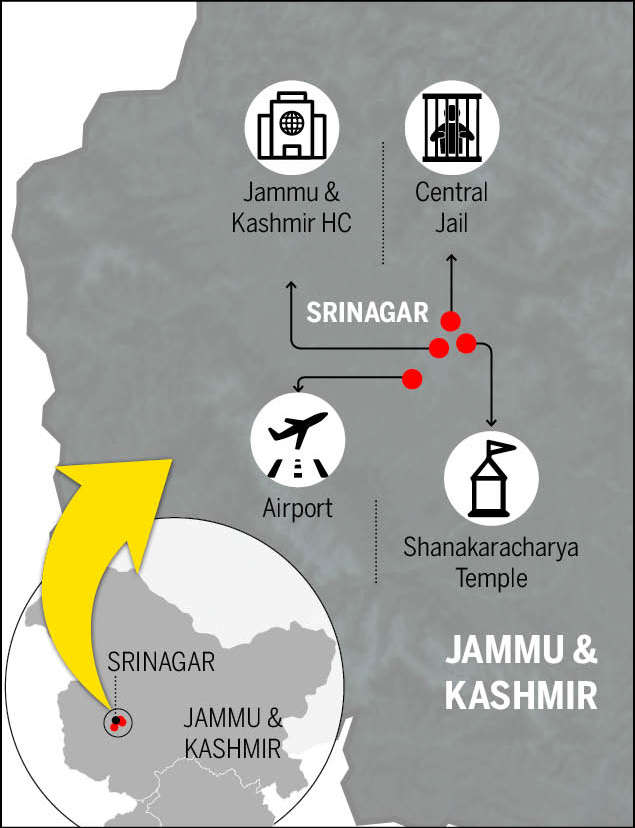Central Reserve Police Force (CRPF)
This is a collection of articles archived for the excellence of their content. |
Women battalions
2019: in Kashmir Valley
Rohan Dua and Aarti Tikoo Singh, March 1, 2019: The Times of India

From: Rohan Dua and Aarti Tikoo Singh, March 1, 2019: The Times of India
For the four companies of CRPF women personnel serving in Jammu and Kashmir, securing its shrines and key government installations, the threat of sudden violence is always present. It could be an impromptu charge by stone pelters or an encounter with militants breaking our nearby. Then there is also the weather, with temperatures dipping below zero at certain places a fairly common occurrence in winter months. But that is barely something they let themselves be bothered with.
Each company consists of 80-odd women and they guard the Shankaracharya temple, Central Jail, Srinagar airport, high court and government buildings in the state capital. At the Shankaracharya temple, they climb up and down the 240 steps to the shrine every day. On some winter days, they clear snow and frisk visitors and pilgrims. It’s a hard life. But ask any of the doughty women about it and they will tell you, almost in one voice, that it’s something they have chosen.
A lot has changed since 1986-87 when a CRPF women’s battalion was raised for the first time. The six women officers recruited were then subsequently sent to Sri Lanka. One thing that hasn’t, is the grit on display.
“It takes something to check women in jails, just to find SIM cards or cash inside fruits or their pherans at times. Or to face their abuse. It is emotionally draining when you have a six-year-old daughter,” said Divya, an inspector recruited from Kerala in 2001.
So how do they cope? By sticking together, they said. Some of the women soldiers turned emotional as they shared stories of their bonhomie, from pipping each other in a badminton game to teaching newcomers how to lift a bukhari (kerosene-run heater). “Or telling the younger ones how to shift from using the INSAS rifle to AK-47 during night operations,” one of them told TOI.
It takes something to check women in jails, just to find SIM cards or cash inside fruits or their pherans at times. Or to face their abuse. It is emotionally draining when you have a six-year-old daughter
Divya, a CRPF inspector from Kerala: “We bond over various things. Sometimes it is a group dance, or even a group selfie over birthday cakes,” said Draupadi, 51, who has spent 29 years in the CRPF with six postings in Kashmir. There are at times arguments over essential items at the line barracks or over food at the mess. “But all that’s fine,” another soldier said. “Part of life here or anywhere else.”
As the TOI team prepares to return from its meeting with the soldiers, they ask one last question. And it’s about the recent attack on CRPF convoy by a local terrorist that killed 40 jawans. They turned teary eyed. Shalu, who is with the CRPF battalion in Bemina, Srinagar, chokes on her words. Recalling the shock and rage her unit and she felt in the immediate aftermath of the car bomb explosion in Pulwama, the 28-year-old said, “I was in a bus carrying 29 other women personnel, and just three buses behind the vehicle that was hit by the one driven by Jaish-e-Muhammad suicide bomber Adil Ahmad Dar.”
We bond over various things. Sometimes it is a group dance, or even a group selfie over birthday cakes
Draupadi has been with CRPF for 29 years, including six postings in Kashmir
She added, “I was speaking to my would-be mother-in-law when the blast occurred. My fiancé is in the Army and posted in Gujarat, so he understood I had to go do my duty. The moment we saw the bus getting blown apart, I was filled with such anger.” A veteran of seven years in the paramilitary force, Shalu’s family in Rajouri is preparing for her wedding on March 9. Shalu’s colleague, Pushpa, 38, another veteran, was on the same bus and returning from leave when the terror attack took place. “I wish I had been armed,” Pushpa said quietly.